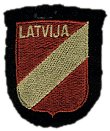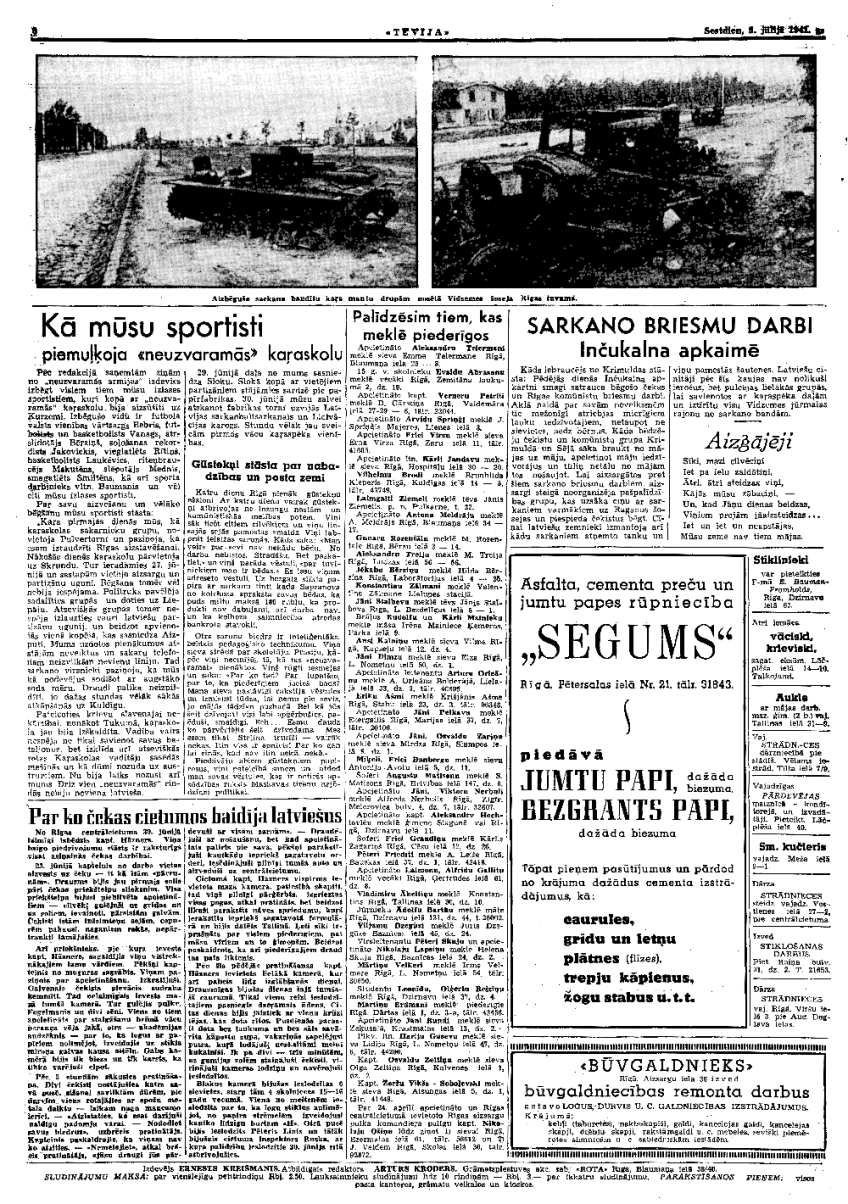15
[1Then, this professional soldier, a product of the Latvian Military Academy and the Staff School, supposedly went home to bed without] 2reporting to his commanding officer. Perhaps he called him on the phone but it is unlikely; at that point there was not even communication between the Self-Defense headquarters and the offices the Self Government according to one of respondent's Australian witnesses. (Meiers dep. 211) A further question is prompted by the above mentioned newspaper article, which appeared on July 5. 3The detail in the story is such that only Hazners could have provided it, but when did he have time for an interview if he was doing all those things he testified about? In his version of the events, he returned to Riga late on the fifth, after the newspaper was published, so the interview must have occurred before then. 23/ Yet how could it have if he was away from Riga?
B. JULY 6-9, 1941.
Continuing his story, Hazners said that he slept around the clock July 6, and on the seventh, reported to the Headquarters of the Self-Government on Merkela Street. (tr. 10292) 24/ Two of Hazners' witnesses, Plensers and Meiers, said that they saw Hazners on July 6, the day he was sleeping. Meiers, Ludriksons and Voitkus 25/ mentioned seeing Hazners on the seventh, but not at the Self-Government. Of course, minor inconsistencies are to be expected given the time lapse in this case; they merely prove the impossibility remembering every detail exactly.
| 23/ | 4Interestingly, there is no reference in the article to Hazners' exploits in rounding up the Russians; other stories on the same page are full of such tales. |
| 24/ | According to Hazners, the Self-Government was on Merkela Street and in early July, the Self-Defense was on Meierovics. (tr. 10323) Sirants, who worked at the Self-Defense, confirmed that it was on Meirovics. (Sirants dep. 2, 84) |
| 25/ | Voitkus remembers it as July 7 or 8. |
Examination
[pg 14] 1“Then, this professional soldier, a product of the Latvian Military Academy and the Staff School, supposedly went home to bed without” [pg 15] 2“reporting to his commanding officer. Perhaps he called him on the phone but it is unlikely; at that point there was not even communication between the Self-Defense headquarters and the offices the Self Government according to one of respondent's Australian witnesses.”
As Hāzners recounts in his memoir, he and his "company" had been assembled hastily and ad hoc. When Hāzners was recognized at the assembly point, he was told to head up the men being sent to Mangaļsala. Contact would have been kept up by messenger if other communications were not available. However, as testimony—misrepresented by the INS—established, phone communications between suburbs, and between Rīga and the suburbs, were intact. After five days there, their work intercepting retreating Red Army was done. Hāzners messaged Veiss to request leave; he received Veiss' response granting it. Additionally, a number of the partisans also returned to Rīga. With that, the Mangaļsala operation was terminated and protection duties assumed by the local Police District No. 11.
The INS's contention Hāzners went home "without reporting" is another lie.
3“The detail in the story is such that only Hazners could have provided it, but when did he have time for an interview if he was doing all those things he testified about?” . . . [footnote] 4“Interestingly, there is no reference in the article to Hazners' exploits in rounding up the Russians; other stories on the same page are full of such tales.”
The INS is more than happy to apply Occam's razor to the testimony against Hāzners, that is, if he was said to have committed heinous acts, then he did, plain and simple. But when it comes to Hāzners's alibi, no convolution of logic lies beyond the INS's reach.
According to the INS:
- A detailed article appears on July 5th regarding Hāzners's recent imprisonment and escape.
- The article is so detailed it must have been an interview.
- The interview had to have taken place no later than the 4th.
- Hāzners could not have had time for an interview if he was pursuing Russians on or around the 4th.
- Plus, he would have never returned home without reporting to his commanding officer.
- Plus, the article mentions nothing about Mangaļsala even though numerous other articles on the same page are filled with anti-Soviet exploits.
- Therefore, he must be lying about pursuing Russians in Mangaļsala.
- Therefore, he had plenty of time to brutalize Jews in Rīga.
- Besides, even if Hāzners was where he said he was, he could have easily come into Rīga ("15 minutes by car") to freelance beating up Jews and knocking their teeth out in plenty of time to get back to Mangaļsala.5
The far simpler explanation is:
- As Hāzners recounts in his memoir, upon breaking out of their cells, the other inmates elected Hāzners as their leader as they organized to defend themselves until the Germans arrived and secured the prison. Those present would have discussed their experiences. Since Hāzners was acquainted with Ernests Kreišmanis, listed as Tēvija's publisher and also a former army officer, it is unsurprising that there could have been interest in piecing together an account of Hāzners's experiences. The propagandist tone also implies involvement of the Nazi occupiers in crafting and reviewing the narrative, which would have taken time.
- Since the account of Hāzners's incarceration ends with his release, it could have been gathered at any time, certainly before Hāzners was dispatched.
- Therefore, there is no reason to doubt Hāzners was deployed in Mangaļsala as testified, spent the 6th home as testified (in his memoirs, outside, watching the clouds roll by, feeling lucky to be alive), then went into Rīga on the 7th, as testified.
What Latvians were scared of in the Cheka's prisons
On June 30, Captain Hāzners fortuitously escaped from Rīga Central Prison. The story of his nightmarish experience is typical of the whole bloody Chekist operation.
On June 25th, the captain was taken from work to the Cheka — supposedly for a short "talk." The first step across the threshold of the Cheka lobby was terror-inducing. The whole anteroom was jammed full with detainees — people lying on the floor and on benches, injured, heads split open. Chekists, revealing their native-born faces, hats hanging off the backs of their necks, claw-like ["long-fingernailed"] hands, cursed non-stop.6
The officer to whom captain Hāzners was brought in greeted him with a cornucopia of slurs, as well. Suddenly, the captain was grabbed from behind. He was informed of his arrest. They patted him down. The Chekist in charge stole his silver comb. Then the unfortunate [Hāzners] was taken into a small dark cell. Colonel Fogelmanis lay there, along with two boys. One of them had been arrested for walking around wearing a brown German-style windbreaker, the other — an academy student — for gluing papers on a window to create a picture of a mug made of a skull ["dead man's head"]. The air in the cell was so thick and hot that they could barely breathe.
Three hours later, the interrogation began. Two Chekists flanked him, hands clenched in fists, ready to administer a beating. By the door, another fiddled with a shiny metal instrument — probably for ripping out fingernails. «Confess your deeds against the Soviet state! — Give up your cohorts!», screamed his inquisitor. The captain explained he had nothing to confess. — «Don't lie!» his inquisitor continued to screamed, «Your friends have sold you out, bowels and all». They threatened to shoot him, but when the prisoner remained steadfast, they suddenly signed some pre-prepared warrant, put him in a blacked-out car, and whisked him away to the central prison.
At the prison, captain Hāzners was first placed in a small cell, indeed, a closet. He was changed out of all his clothes, button cut off, interrogated again, and finally ordered to sign his own death sentence, which had been filled in on a form, already prepared and dated in Tallinn. They question him in the minutest detail about his entire family, even his brothers-in-law and their their [i.e., his sisters'] families. At the end, he is told the same fate threatens all his relatives.
"Our dear husband, father, and grand-papa" Pēteris Līnis's obituary notice, died June 25, 1941, the day of Hāzners's arrest — appearing in the same Tēvija issue as Hāzners's story
After this last interrogation, captain Hāzners is places in a larger cell, where he remained until the day of his rescue. Frightful were the days passed in this dark hole. Prisoners were given drinking water only once. On other days, one had to get by with one cup of tea given in the morning. Lunch was a meatless unsalted cabbage soup, and for dinner, moldy porridge overrun with countless ants. Every two — or three minutes Chekists in their rubber-soled boots came by to flip open the cell window and check on the prisoners.
Six women had been imprisoned in the adjacent cell, including four school-children, aged 15-16. One of the girls was locked up for making something looking somewhat like the letter "H" out of paper strips and gluing them to window panes. Pēteris Līnis had been imprisoned in the cell opposite, and down the hallway was former prison inspector Ruska, with whose assistance the prisoners were able to free themselves on June 30th.
That does still leave one question, is it really true that "[i]nterestingly, there is no reference in the article to Hazners' exploits in rounding up the Russians; other stories on the same page are full of such tales."?
- "Kā mūsu sportisti piemuļķoja 'neuzvaramā' kaŗaskolu"—notable Latvian athletes who had been drafted into the Red Army to defend Rīga against the German invasion escape from military training custody.
- "Gūstekņi stāsta par nabadzības un posta zemi"—Freed POWs arrive daily, gaunt faces smiling, telling of the deprivations under the Soviets and concerned for those still subjugated.
- "Palīdzēsim tiem, kas meklē piederīgos"—"Let us help those who are seeking family members," a list of some forty people and the names of those they are seeking.
- "Sarkano Briesmu Darbi Inčukalna apkaimē"—Someone arriving from Krimulda relates that in the last few days around Inčukalns, in a final paroxysm of violence, retreating NKVD and Soviets went door to door "arresting" everyone, taking them out, and shooting them. Locals resisted with abandoned weapons.
- Help wanted ads, atop the list, glaziers.
- Advertisement for roofing supplies.
- Advertisement for furniture repair.
- "Aizgājēji"—a pseudo-nursery rhyme—judging by the use of diminutives—about the departing Soviets:
Little itsy-bitsy people
Little soldiers passing along the street
Scurrying, scurrying along they go
Wearing the booties off our feet—
And, when the days of Jāņi7 are over,
Away they'll have to scurry ...
Going, going, never stopping,
There's no home for them in our land.
The athletes' escape is the only other article which could qualify as an "exploit."
| 1 | Testimony of Janis Meiers, 1-November-1978, deposition. |
| 2 | Testimony of Vilis A. Hazners, 8-March-1978, direct, transcript pp. 1019–1059. |
| 3 | Testimony of Vilis A. Hazners, 8-March-1978, direct, transcript pp. 1019–1059. |
| 4 | Testimony of Valentins Sirants, 1-November-1978, deposition. |
| 5 | Brief, page 14. |
| 6 | The Nazis took over the press and published the first issue of Tēvija the same day they occupied Rīga, the capital. This caricature is clearly meant to evoke some sort of Nazist anti-Semitic imagery. |
| 7 | Summer solstice holiday, typically celebrated in Latvia by three days off from work. Solstice in Rīga in 1941 took place Saturday, June 21st at 22:33:02. |

